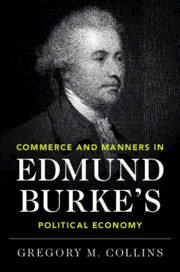Book contents
- Commerce and Manners in Edmund Burke’s Political Economy
- Commerce and Manners in Edmund Burke’s Political Economy
- Copyright page
- Dedication
- Contents
- Figures
- Tables
- Acknowledgments
- Introduction
- Part I Biography
- Part II Market Economies
- 2 Thoughts and Details on Scarcity, Supply and Demand, and Middlemen
- 3 Agricultural Policy, Labor, and Wealth Redistribution
- 4 Markets, Rationalism, and the Hayek Connection
- Part III The British Constitution and Economical Reform
- Part IV Foreign Trade
- Part V India
- Part VI The French Revolution
- Conclusion
- Bibliography
- Index
3 - Agricultural Policy, Labor, and Wealth Redistribution
from Part II - Market Economies
Published online by Cambridge University Press: 24 April 2020
- Commerce and Manners in Edmund Burke’s Political Economy
- Commerce and Manners in Edmund Burke’s Political Economy
- Copyright page
- Dedication
- Contents
- Figures
- Tables
- Acknowledgments
- Introduction
- Part I Biography
- Part II Market Economies
- 2 Thoughts and Details on Scarcity, Supply and Demand, and Middlemen
- 3 Agricultural Policy, Labor, and Wealth Redistribution
- 4 Markets, Rationalism, and the Hayek Connection
- Part III The British Constitution and Economical Reform
- Part IV Foreign Trade
- Part V India
- Part VI The French Revolution
- Conclusion
- Bibliography
- Index
Summary
Chapter 3 investigates Burke’s thoughts on the Corn Laws and the enclosure movement. Burke’s support for the corn bounty was one of the rare exceptions in which he defended state intervention in the market. Burke believed that the bounty had made corn cheaper in the long run and empowered the landed interest to compete in the foreign market. I also examine how Burke generally viewed enclosure in a favorable light for encouraging productive agricultural activity; he maintained, however, that the practice should be carried out in a transparent and lawful manner. In addition, I explore broader themes of Burke’s views on the agricultural economy. He held that the rich were the trustees of the poor, and thus possessed the moral resonsibility to aid them in times of need. I further outline his discussion of the varieties of labor in Thoughts and Details, which he used to demonstrate the hazards in establishing a uniform wage regulation that overlooked such differences. I also investigate Burke’s antipathy to wealth redistribution in the grain market. In his judgment, schemes to take wealth from some to give to others would lead to universal poverty, not universal opulence, and would cause social disorder.
- Type
- Chapter
- Information
- Commerce and Manners in Edmund Burke's Political Economy , pp. 78 - 116Publisher: Cambridge University PressPrint publication year: 2020

